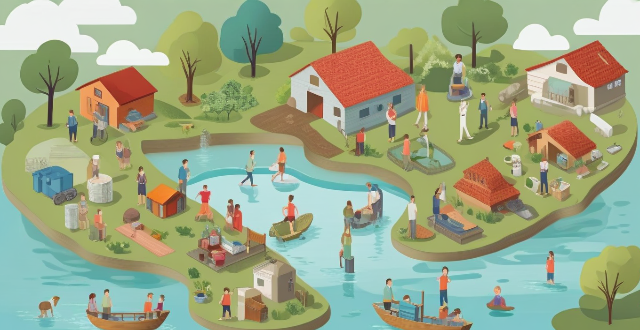Ecosystem services are benefits people obtain from ecosystems, including provisioning, regulating, cultural, and supporting services. These services play a crucial role in maintaining human health, well-being, and economic prosperity. Provisioning services provide food, water, timber, and medicinal resources necessary for human survival. Regulating services help control natural processes and mitigate disasters, protecting us from environmental hazards. Cultural services encompass non-material benefits like spiritual enrichment, recreation, and education. Supporting services enable the production of all other ecosystem services and are fundamental to the functioning of ecosystems. Preserving and enhancing these services through sustainable practices ensures a healthier planet and a brighter future for generations to come.

Ecosystem Services: An Overview
Ecosystem services are the benefits that people obtain from ecosystems. These services can be classified into four main categories: provisioning, regulating, cultural, and supporting services. They play a crucial role in maintaining human health, well-being, and economic prosperity. Let's delve deeper into each category and understand their significance.
Provisioning Services
Provisioning services include those that provide food, water, and other materials necessary for human survival. This category includes:
- Food production (e.g., crops, livestock)
- Water supply (e.g., freshwater from lakes, rivers, and groundwater)
- Timber and fiber (e.g., wood, cotton)
- Medicinal resources (e.g., plants used in traditional medicine)
Importance of Provisioning Services
Provisioning services are vital for meeting basic human needs such as food, water, and shelter. Without these services, it would be challenging to sustain human life and development.
Regulating Services
Regulating services help control natural processes and mitigate disasters. This category includes:
- Climate regulation (e.g., carbon sequestration by forests)
- Disease regulation (e.g., reduction of disease vectors by predators)
- Water purification (e.g., filtration by wetlands)
- Pollination (e.g., transfer of pollen by insects)
Importance of Regulating Services
Regulating services protect us from environmental hazards and contribute to a stable climate. For instance, without pollinators like bees, many crops would not be produced, leading to food scarcity and economic losses.
Cultural Services
Cultural services encompass non-material benefits like spiritual enrichment, recreation, and education. This category includes:
- Aesthetic values (e.g., landscape beauty)
- Recreational activities (e.g., hiking, birdwatching)
- Spiritual and religious experiences (e.g., sacred groves)
- Educational opportunities (e.g., learning about nature)
Importance of Cultural Services
Cultural services contribute to mental well-being and social cohesion. They provide opportunities for relaxation, inspiration, and connection with nature, which is essential for overall happiness and quality of life.
Supporting Services
Supporting services are those that enable the production of all other ecosystem services. This category includes:
- Soil formation (e.g., nutrient cycling)
- Photosynthesis (e.g., energy conversion)
- Biodiversity maintenance (e.g., habitat provision)
Importance of Supporting Services
Supporting services are fundamental to the functioning of ecosystems and the generation of all other ecosystem services. Without them, the entire system could collapse, affecting our ability to benefit from nature's resources.
Conclusion
Ecosystem services are incredibly important because they support human life in numerous ways, from providing essential resources like food and water to offering cultural enrichment and spiritual fulfillment. By preserving and enhancing these services through sustainable practices, we can ensure a healthier planet and a brighter future for generations to come.